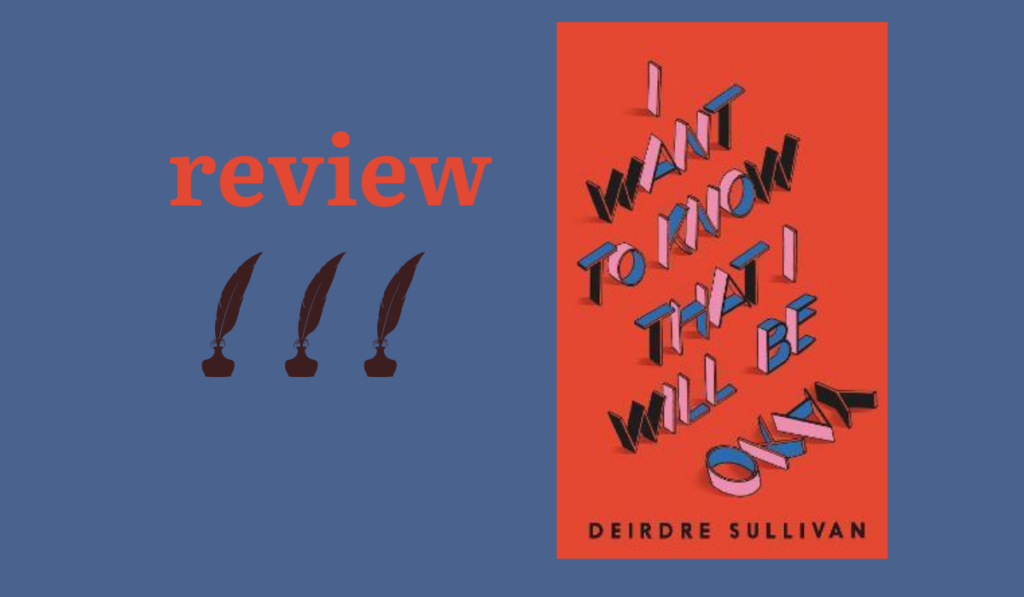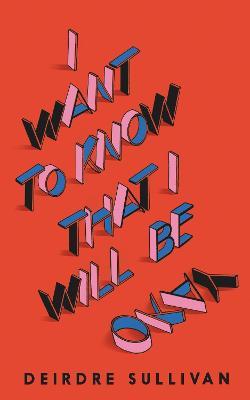
I Want To Know That I Will Be Okay|Deirdre Sullivan|Banshee Press|Hardback €18.00|ISBN: 9781838312602
by Fiona Murphy
The mind is traitor to the body in this collection of fourteen short stories by Deirdre Sullivan. This is her adult fiction debut, and as a major fan of her An Post Young Adult Book of the Year, Savage her Reply (Little Island), I had high expectations for this book.
Sullivan is a writer who drops a breadcrumb trail of seemingly innocuous detail throughout her stories, and we are Hansel and Gretel, picking our way through the twisting, dark forest of her prose to find our way out the other side.

Her stories are unnerving in their ordinary nature, stories we have heard before: the insecure teenager; the frightened child; the complicated mother-daughter relationship—but they are twisted, turned unfamiliar, like a different face looking back at us from the mirror. Normal life is staccato-ed and punctuated with exclamation marks where we least expect it.
The real horror is not the monster in the well, but the things that happen inside us, in bodies we can’t rely on, in minds we can’t trust.
Sullivan’s writing is spare and rolling, a different experience to her YA books that are full of rich and imaginative imagery. This book will have you picking at old scabs, biting the skin from your lips, gnawing the nail on your thumb. This is an intense read; despair is richly detailed here, and needs to be consumed in slow, small bites.
Sullivan’s collection is an extraordinary well-written lesson in powerlessness, a common denominator in her characters. They are all terrified to live and not live, all distant, all in perpetual war with their own flesh. Sullivan’s writing, in contrast, is so powerful that it leaves you wrecked after reading, as if these women have temporarily possessed your body and replaced your eyes, your heart, with their own.
It takes a while to see it, but there is a formula to these stories, the breadcrumb trail of events that can be traced throughout the varied viewpoints and stories: anxiety and detachment from the world; attempts at control; the rebellion of the body when it cannot be controlled.
Anxiety and removal are what make Sullivan’s protagonists so draining. The portrayal of their mental states is so visceral that we feel wrung out by the end of each story. Their lives feel fruitless and listless, the constant attempts to live up to other’s standards and their own an insurmountable task.
There is a helplessness fluttering in our chests as things happen to them—because they don’t participate in life, life just happens to them. They look down on scenes as if from above, watching their lives passively turn them this way and that, like an errant wind.
Odd, lonely and internally and externally in pain, they watch life happening from a dispassionate or panicked distance. Sometimes there is even generational difference between the narrator and the subject of the story, but there is always sympathy there, some connection between the two characters, of being broken or cowed or afraid. The conclusions to each narrative are short, sharp and defeated, before the story ever even begins. We are breathless waiting for characters to rise up, yet more often than not they crumple—but this is Sullivan’s intent.
It is in breaking that we see the beauty of the body when it isn’t being controlled.
These women attempt to control range from influencing the body, to defeat the endless march of decay, to try to see down every path before they take it—and end up taking no path at all, paralysed by indecision. They pick away at their bodies and minds, watching them slowly disappear into nothingness, diminishing themselves to diminish their existence in the world. Their minds are a vortex into which their bodies disappear, the psychological chipping away at the physical in an attempt to deal with the mental. The mind won’t stop until they are negative space.
All of this would have made a dark, compelling story collection in itself, but what really puts Sullivan’s body of work over the edge are the moments she allows the bodies to retaliate like a provoked animal.
When these women’s bodies push back against the control of the mind, this produces strange and off-kilter moments: a spool of hair unravels from the inner thighs; a string of pearls nestles in the breast; an animal foetus is inserted in the womb.

Sullivan is trying to tell us something between the recurring motifs of suggested rapes, miscarriages and supernatural and psychological happenings. The moments of violation and terror happen off-stage. We are not voyeurs to the things we already know are happening which receive all the wrong kinds of attention. We are there to make sense of what happens before and after, of the patchwork, the repeating ideas, the elements of one story reappearing in another, Cloud Atlas-style.
We piece this jigsaw of broken, mismatched and jagged narratives together to show that experiences of womanhood are bursting with variety—but now and again our voices join in harmony, to shriek into the darkness against the breathless, tightly controlled dance of our lives: we want to know that we will be okay.
Signed, limited edition hardbacks of I Want to Know That I Will Be Okay are available to pre-order now at Kenny’s Book Shop












